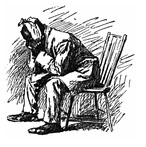
A Deficit of Heroes
NEW OXFORD NOTEBOOK
There is not a righteous man on earth who does good and never sins. — Ecclesiastes 7:20
By all accounts, Jean Vanier was a hero. He might have been a saint.
Vanier is best known for founding l’Arche, a series of communities in which the intellectually disabled live side by side with the non-disabled. Vanier, son of the 19th governor general of Canada, launched his apostolate accidentally when he took two handicapped men out of a large institution and welcomed them into his home in Trosly-Breuil, France, in 1964. Eventually, l’Arche (French for “the Ark,” as in Noah’s ark) would become an international nonprofit organization operating in 38 countries throughout the world, including Belgium, Argentina, Uganda, Japan, and the United States. Each of its 154 communities consists of homes, programs, and support networks designed to assist people with intellectual disabilities live fulfilling, happy lives. Vanier, who passed away in May 2019, was a Catholic layman, and the spirit of the Gospel influenced virtually every aspect of his mission of serving those whom society has forgotten or discarded.
The communities of l’Arche represent a radical rejection of the modern world’s utilitarian logic. At l’Arche, the notions of normal and abnormal, strong and weak, rich and poor are turned on their ear. “Assistants,” as the able-bodied are called, are not primarily the helpers or teachers of the disabled; rather, the disabled are the teachers of the intelligent and robust. The strong learn from the weak, and the weak learn from those weaker still.
Fr. Henri J.M. Nouwen lived at the original l’Arche community in Trosly in 1985. During his initial visits, he published his diary entries in the NOR. (Nouwen would eventually become pastor of Daybreak, a l’Arche community near Toronto.)
Writing in our September 1986 issue, Fr. Nouwen says Vanier knew he was “doing something irreversible” when he invited the two first men to live with him in his home, but he didn’t know quite what it was or would become. The men “had no family to which he could send them, nor could he ever return them to the institution from which they came.” At the time, Vanier was a professor of philosophy at St. Michael’s College in Toronto, and he gave up a successful academic career to accommodate his new housemates. With this decision, Fr. Nouwen writes, Vanier would “embark on a journey, the end of which was barely visible. As far as Jean was concerned, living with Raphael and Philippe was to be his vocation. He had no plans to start a large movement, nor was he thinking about an international network of homes for the handicapped.” Yet that is precisely what Vanier did and what he built.
You May Also Enjoy
Gender ideologues are at work in the Church -- no surprise. That they occupy positions of power and speak with authority is, however, cause for great concern.
Our struggles in the U.S. are a far cry from the hard persecution that our coreligionists elsewhere in the world face on a routine basis.
The Catholic Church's sex-abuse problem is caused by predators who wear clerical collars and who are protected by a clericalist culture.

